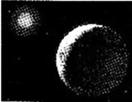
China's first moon rover (月球车), Yutu, set off from the lander(登陆车) early on December 15, several hours after the Chang'e-3
probe (探测器) soft-landed on the moon surface.
The 140 kg six-wheeled rover touched the moon surface at 4:35 a.m., leaving deep lines on the loose moon land. This was recorded by the camera on the lander and the images were sent to the earth,
according to the Beijing Aerospace Control Center. After that, the rover and
lander will take photos of each other and start their own science explorations.
Earlier this morning, engineers made final checks of
the environment of the landing area and the situation of the probe(探测仪). Yutu, reached its solar panel (光板) and started to drive slowly to the moon at 3:10 a.m.. It took Yutu nearly a whole hour to complete the simple task.
Chang'e-3 landed at the Bay of Rainbows on the moon,
at 9:11 p.m. on December 14, making China the third country in the world to
carry out such a mission (执行此类任务) after the United
States and Russia.
In old Chinese tales, Yutu was the white pet rabbit of
Chang'e’s. The name for the rover was selected following an online survey that
collected several million votes from people around the world.
The rover, 1.5 meters long with its two wings folded (折叠), 1 m in width and 1.1 m in height, is a perfect robot controlled by the command center from the earth. It will face challenges including temperature differences of more than 300℃ on the
moon.
Yutu will do some research and look for natural
resources (资源) for three months, while the lander will
conduct an exploration at the landing place for one year. Then they will have a
good rest on the moon and will not be used for a long time until China’s next
probe visits the moon again.
1.Which
is the best title for the passage above?
A. The American’sfirst rover on the moon
B. The tale of Chang’e
C. The journey to the
moon
D. Yutu explores the moon
2.Which
is the correct order of the following events?
a. The 140 kg six-wheeled rover touched the moon surface.
b. The rover and lander will take photos of each other.
c. Yutu started to drive slowly to the moon.
d. Chang'e-3 landed at the Bay of Rainbows on the
moon.
A. a-b-c-d B.
c-d-a-b C.
d-c-a-b D.
c-a-b-d
3.What
does the underlined word “width” mean in
Chinese?
A. 智力 B.
宽度 C.
重量 D.
长度
4.Which
of the following is true according to the passage?
A. The moon had been visited by only two countries
before 2013.
B. Yutu is a perfect robot under the control of its
own computer.
C. Yutu and Chang’e will return to the earth after the
one-year mission.
D. Chang’e-3 is 140 kg in weight.
5.There
will soon be a second moon rover to explore the moon. Which is its proper name?
A. Chang’e-5 B.
Yutu-2 C. Shenzhou-11 D.Tiangong-2

 After spending years searching for a planet with life, scientists may have found one. In September 2010, a team of US scientists discovered an Earth-sized planet called Gliese 581g. It has a surface temperature neither too hot nor too cold for liquid(液态)water. Scientists think there is a chance that the planet could have life.
After spending years searching for a planet with life, scientists may have found one. In September 2010, a team of US scientists discovered an Earth-sized planet called Gliese 581g. It has a surface temperature neither too hot nor too cold for liquid(液态)water. Scientists think there is a chance that the planet could have life.